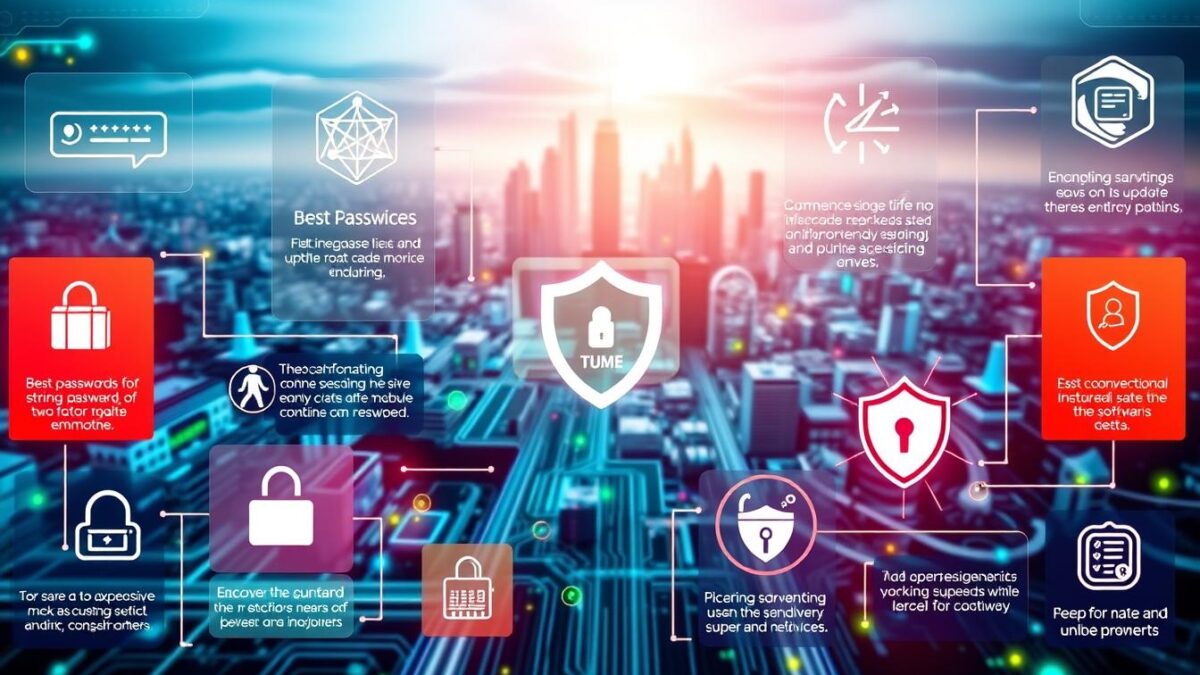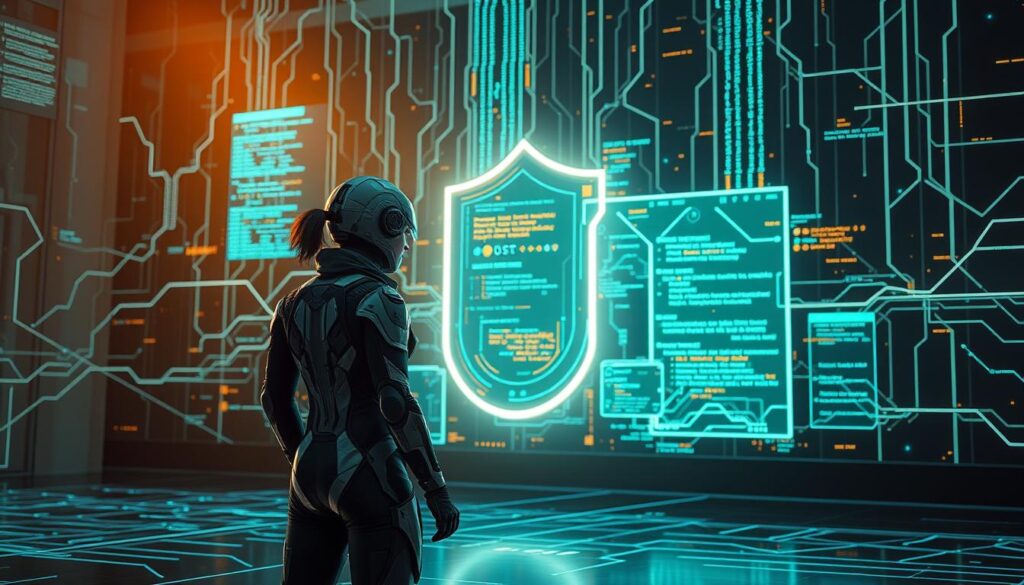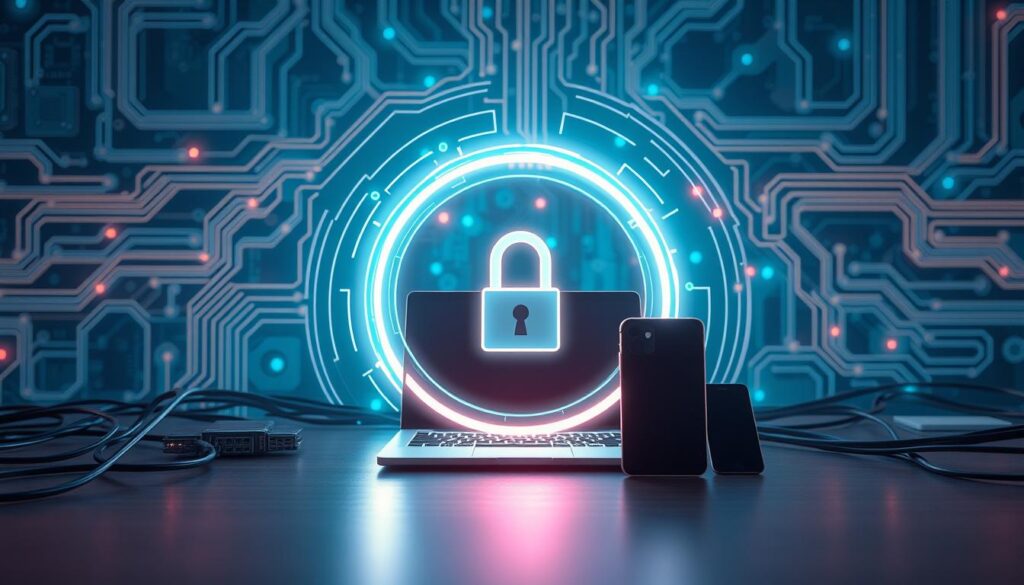
Stay Safe Online: Optimize Your Cybersecurity with These Tips
In today’s digital age, online security is more important than ever. With the increasing number of cyber threats and data breaches, it’s essential to take proactive measures to protect your internet security. Cyber security is a critical aspect of our digital lives, and it’s crucial to stay informed about the latest threats and protection methods.
To optimize your online security, you need to understand the basics of cyber security and take steps to protect your digital life. From creating strong passwords to using two-factor authentication, there are many ways to secure your internet security and stay safe online.
Introduction to Online Security
By following expert tips and advice, you can significantly reduce the risk of cyber attacks and data breaches, ensuring your online security and internet security are always up to date.
Key Takeaways
- Online security is crucial in today’s digital age
- Cyber security threats are increasing every day
- Internet security can be optimized with simple steps
- Creating strong passwords is essential for online security
- Two-factor authentication can significantly reduce cyber attacks
- Staying informed about the latest cyber security threats is critical
Understanding the Basics of Online Security
As we navigate the online world, it’s essential to understand the basics of online security to protect our data protection and maintain digital safety. The internet is a complex network of interconnected devices, making it a prime target for cyber attacks. To ensure online privacy, we need to be aware of the potential risks and take measures to prevent them.
The internet’s vulnerability stems from its open nature, allowing anyone to access and share information. This openness also makes it easier for hackers to exploit weaknesses and launch cyber attacks. Common security threats include phishing, malware, and ransomware, which can have a significant impact on individuals and businesses.
To better understand the risks, let’s look at some common security threats:
- Phishing: attempts to trick users into revealing sensitive information
- Malware: software designed to harm or exploit devices
- Ransomware: malware that demands payment in exchange for restoring access to data
By understanding these threats and taking steps to protect our online security, we can reduce the risk of cyber attacks and maintain our online privacy. This includes using strong passwords, keeping software up to date, and being cautious when sharing personal information online.
Creating Strong Passwords That Actually Work
To protect your online security, creating strong passwords is essential. This is a crucial cybersecurity measure that can prevent unauthorized access to your accounts and sensitive information. A strong password should be unique, complex, and difficult to guess. It’s recommended to use a combination of uppercase and lowercase letters, numbers, and special characters.
Using strong passwords is vital for secure online transactions. You can use a password manager to generate and store unique passwords for each of your online accounts. This will help you keep track of your passwords and ensure that you’re using a different password for each account.
Here are some tips for creating strong passwords:
- Use a combination of uppercase and lowercase letters, numbers, and special characters
- Make sure your password is at least 12 characters long
- Avoid using easily guessable information, such as your name or birthdate
- Use a password manager to generate and store unique passwords for each of your online accounts
By following these tips, you can create strong passwords that will help protect your online security and ensure secure online transactions. Remember to always use a combination of characters and to make sure your password is unique and difficult to guess.
The Essential Role of Two-Factor Authentication
Two-factor authentication (2FA) is a crucial component of online security, providing an additional layer of protection for your accounts. By requiring a second form of verification, such as a code sent to your phone or a biometric scan, 2FA makes it more difficult for hackers to gain access to your sensitive information. This is especially important in today’s digital landscape, where internet security threats are becoming increasingly sophisticated.
In order to understand the importance of 2FA, it’s essential to recognize the various types of 2FA methods available. These include:
- SMS-based 2FA, which sends a verification code to your phone via text message
- Authenticator apps, which generate a unique code that must be entered to access your account
- Biometric authentication, which uses fingerprint or facial recognition technology to verify your identity
Setting up 2FA on popular platforms, such as Google and Facebook, is a straightforward process that can significantly enhance your online security. By taking this extra step, you can protect your accounts from unauthorized access and reduce the risk of internet security breaches.
Securing Your Home Network
To protect your online security, it’s essential to secure your home network. This involves taking several steps to prevent unauthorized access to your devices and sensitive information. In the context of cyber security, securing your home network is crucial to prevent data breaches and protect your personal data.
Some key measures to secure your home network include changing the default password on your router, enabling WPA2 encryption, and setting up a guest network. Using a firewall and keeping your operating system and software up-to-date are also vital for data protection. By taking these steps, you can significantly reduce the risk of cyber attacks and protect your online security.
Here are some additional tips to enhance your home network security:
- Use strong passwords for all devices connected to your network
- Limit access to your network by using a guest network for visitors
- Regularly update your router’s firmware and software
By following these tips and taking a proactive approach to cyber security and data protection, you can ensure a safe and secure online experience at home.

Safe Browsing Habits and Best Practices
To protect your online privacy, it’s essential to develop safe browsing habits. This includes being mindful of the websites you visit and the information you share online. Online privacy is a critical aspect of cybersecurity, and taking the right measures can help prevent cyber attacks.
When browsing online, look for the “https” prefix in the URL and a lock icon in the address bar, indicating that the website is secure. This is a crucial cybersecurity measure that can help protect your personal data. Additionally, be cautious of suspicious emails and websites that may be phishing attempts.
Using Secure Websites
Using secure websites is vital to protecting your online privacy. Here are some tips to help you identify secure websites:
- Look for the “https” prefix in the URL
- Check for a lock icon in the address bar
- Be cautious of suspicious emails and websites
Recognizing Phishing Attempts
Phishing attempts can be tricky to recognize, but there are some common signs to look out for. These include:
- Urgent or threatening messages
- Requests for personal or financial information
- Spelling or grammar mistakes
Managing Browser Settings
Managing your browser settings can also help protect your online privacy. This includes clearing cookies and browsing history, as well as using cybersecurity measures such as two-factor authentication.
Protecting Your Personal Data Online
Protecting your personal data online is crucial for maintaining digital safety and preventing identity theft. This can be achieved by being cautious of suspicious emails and websites, using strong passwords, and enabling two-factor authentication.
To further enhance online security, it is recommended to use a virtual private network (VPN) when browsing public Wi-Fi networks and to keep your operating system and software up-to-date. By taking these precautions, you can prevent unauthorized access to your sensitive information and protect your digital safety.
Here are some additional tips to protect your personal data online:
- Use unique and complex passwords for each account
- Enable two-factor authentication whenever possible
- Be cautious of phishing attempts and suspicious emails
- Keep your operating system and software up-to-date
By following these tips and being mindful of your online activities, you can significantly enhance your digital safety and protect your personal data from unauthorized access. Remember, online security is an ongoing process that requires constant vigilance and attention to detail.
Mobile Device Security Essentials
As we increasingly rely on our mobile devices to access the internet and manage our online lives, ensuring their security is crucial for protecting our internet security and cyber security. Mobile devices are vulnerable to various threats, including malware, phishing attacks, and unauthorized access. To safeguard our personal data and prevent cyber attacks, it’s essential to take proactive measures.
When it comes to mobile device security, there are several key aspects to focus on. These include managing app permissions, using mobile antivirus solutions, and following secure mobile banking tips. By being mindful of the apps we download and the permissions we grant them, we can significantly reduce the risk of cyber threats. Additionally, using reputable mobile antivirus software can help detect and remove malware, protecting our devices and sensitive information.
Some best practices for mobile device security include:
- Regularly updating our devices’ operating systems and apps
- Using strong, unique passwords and enabling two-factor authentication
- Being cautious when clicking on links or downloading attachments from unknown sources
- Using a secure connection when accessing sensitive information online
By following these guidelines and staying informed about the latest cyber security threats, we can effectively protect our mobile devices and maintain our overall internet security. Remember, a secure mobile device is an essential component of a comprehensive cyber security strategy.
Virtual Private Networks (VPNs) and Their Importance
When it comes to protecting your online privacy and security, using a Virtual Private Network (VPN) is essential. A VPN creates a secure and encrypted connection between your device and the internet, making it difficult for hackers to intercept your data. This is especially important when browsing public Wi-Fi networks, as they can be vulnerable to cyber attacks.
By using a VPN, you can protect your online security and online privacy by masking your IP address and location. This can also help you bypass geo-restrictions and access content that may be blocked in your region. VPNs are a crucial part of cybersecurity measures that can help safeguard your personal data and prevent identity theft.
Some of the benefits of using a VPN include:
- Secure and encrypted connection
- Protection of online privacy and security
- Ability to bypass geo-restrictions
- Access to blocked content
In today’s digital age, it’s more important than ever to take cybersecurity measures to protect yourself online. Using a VPN is a simple and effective way to enhance your online privacy and security. By taking this step, you can help safeguard your personal data and prevent cyber attacks.

Social Media Privacy Settings and Security
As we navigate the online world, our social media presence plays a significant role in our overall online security. With the rise of social media, it’s essential to review and adjust our privacy settings to protect our personal information and maintain internet security. Each social media platform has its unique set of security features and privacy controls, making it crucial to understand how to use them effectively.
To start, let’s look at some of the key security features and privacy controls available on popular social media platforms:
- Facebook: two-factor authentication, login alerts, and privacy controls to manage who can see your posts and personal information
- Instagram: privacy controls to control who can see your posts and stories, as well as features to manage your online presence
- Twitter: safety tools to help manage your online presence, including features to control who can see your tweets and personal information
By taking the time to review and adjust our social media privacy settings, we can significantly enhance our online security and protect our personal information from potential threats. Remember to always prioritize internet security when using social media, and take advantage of the security features and privacy controls available to you.
Security Software and Tools You Need
To protect your online security and ensure effective cyber security, it’s essential to have the right software and tools in place. This includes antivirus software, firewalls, and malware removal tools. Antivirus software can help protect your device from malware and other cyber threats, while firewalls can help block unauthorized access to your device.
Malware removal tools can help remove malicious software from your device and prevent further damage. Additionally, using a password manager and a VPN can also help protect your online security and data protection. Some popular options include Norton Antivirus, McAfee, and Kaspersky.
When choosing security software and tools, consider the following factors:
- Effectiveness in detecting and removing malware
- Ease of use and installation
- Compatibility with your device and operating system
- Customer support and updates
By investing in the right security software and tools, you can significantly enhance your cyber security and data protection, giving you peace of mind while browsing online.
Conclusion: Maintaining Your Digital Safety in an Ever-Evolving Online World
As we navigate the ever-evolving digital world, maintaining robust online security and digital safety is paramount. This article has provided a comprehensive guide to help you protect your sensitive information and prevent cyber threats. By implementing the strategies outlined, you can fortify your online defenses and safeguard your digital well-being.
Remember, the landscape of cybersecurity is constantly shifting, and staying informed about the latest threats and security measures is crucial. Regularly review your online accounts, update your software, and be vigilant against emerging scams and hacking attempts. With a proactive approach and a commitment to digital hygiene, you can confidently navigate the digital realm and enjoy the countless benefits it has to offer.
Protecting your online security and digital safety is an ongoing journey, but by following the guidelines presented in this article, you’ll be well-equipped to navigate the digital landscape with confidence and peace of mind. Stay safe, stay secure, and embrace the power of the internet while prioritizing your digital well-being.
FAQ
What makes the internet vulnerable?
The internet is a complex network of interconnected devices, making it a prime target for cyber attacks. The internet’s vulnerability is due to the vast number of devices and the ease with which cyber criminals can exploit security weaknesses.
What are some common security threats?
Some of the most common security threats include phishing, malware, and ransomware. These threats can have a significant impact on individuals and businesses, leading to financial loss, damage to reputation, and compromised personal data.
How can creating strong passwords protect my online security?
Creating strong passwords is one of the most effective ways to protect your online security. A strong password should be unique, complex, and difficult to guess. Using a combination of uppercase and lowercase letters, numbers, and special characters can significantly enhance the security of your online accounts.
How does two-factor authentication (2FA) protect my accounts?
Two-factor authentication (2FA) is an additional layer of security that requires you to provide a second form of verification, such as a code sent to your phone or a biometric scan, in addition to your password. 2FA makes it more difficult for hackers to gain access to your accounts, significantly enhancing your online security.
What are some best practices for securing my home network?
Securing your home network is essential to protect your online security. This includes changing the default password on your router, enabling WPA2 encryption, and setting up a guest network. Additionally, using a firewall and keeping your operating system and software up-to-date can help prevent unauthorized access to your devices and protect your sensitive information.
How can I recognize and prevent phishing attempts?
To recognize and prevent phishing attempts, it’s important to be cautious of suspicious emails and websites. Look for the “https” prefix in the URL and a lock icon in the address bar, which indicates that the website is secure. Additionally, never provide sensitive information in response to unsolicited emails or links.
How can a virtual private network (VPN) protect my online privacy and security?
Virtual private networks (VPNs) create a secure and encrypted connection between your device and the internet, making it difficult for hackers to intercept your data. Using a VPN can also help protect your online privacy by masking your IP address and location, especially when browsing public Wi-Fi networks.
How can I manage my social media privacy settings to enhance my security?
Reviewing and adjusting your privacy settings on popular social media platforms, such as Facebook, Instagram, and Twitter, is essential to protect your online security. Each platform has its own set of security features and privacy controls that can help you manage your online presence and protect your sensitive information.
What security software and tools do I need to protect my online security?
Essential security software and tools include antivirus software, firewalls, and malware removal tools. Antivirus software can help protect your device from malware and other cyber threats, while firewalls can help block unauthorized access. Malware removal tools can help remove malicious software and prevent further damage. Additionally, using a password manager and a VPN can also enhance your online security and privacy.